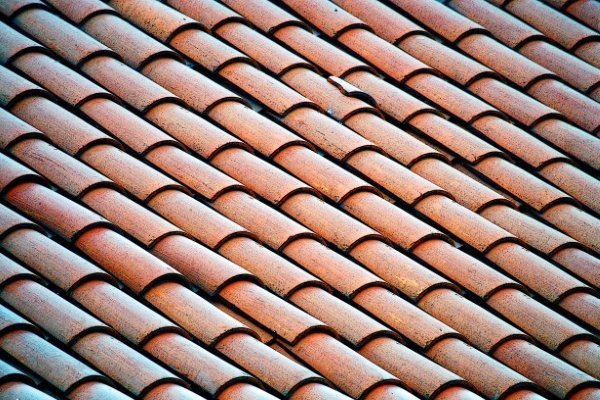
If you ask a Denver CO roofing contractor with in-depth experience, they'll tell you that good roofing requires investment. In fact, most roofers and roofing manufacturers recommend top-shelf materials such as metal, clay tiles, or slate tiles because of their long-term advantages. Clay tiles are excellent replacements for aging asphalt shingle roofs. They last for more than 70 years or even beyond.
In this post from The Spruce, you can see the full picture about clay tiles. They have their specific advantages and shortcomings homeowners need to cope with as well. Read more about them below.
Advantages and Disadvantages of Tile Roofing
Tiled roofs are beautiful and durable. They are also expensive and heavy, but that is perhaps to be expected from a roofing material that can last 100 years. Traditionally, most roofing tiles were made from slate or a fired clay or terra cotta product, but today's roofing titles are very often made from molded, tinted concrete. Roofing tiles can come in many shapes: curved, flat, fluted, or interlocking, and in many styles.
Tile roofing is a great choice for roofs that experience hot weather or exposure to salt air. This is why you very often see tile roofs in the Southwest, coastal Florida, and California. They can also be ideal for climates in which infrequent rains dump large amounts of water in a short time, since many styles are excellent at shedding rainfall from cloudbursts. If you’re considering tile roofing for your home, be aware that these roofing systems are very heavy and can break under certain conditions. Roof framing needs to be very sturdy structurally in order to support the weight.
Pros
Long-lasting: A tile roof can last over 100 years, especially when installed in the right climate. Clay and concrete tile roofs have been known to withstand hail, high winds, and even fire. Once you install tile, you will never have to install another type of roofing again. Just in case, most manufacturers will offer a 50-year warranty.
Impervious to rot and insect damage: (Read more here)
The pros definitely outweigh the cons of clay tiles for roofs. However, most Denver CO homeowners look at one crucially important thing before they decide to use clay tiles: hail damage. Any roof will suffer detrimental damages during a hailstorm including clay tiles. On the other hand, clay tiles suffer minimal cosmetic damages during a single hailstorm.
According to SF Gate Home Guides, hail damage to clay tiles occur only when hailstones are larger than two inches. Read an excerpt about their assessment on clay tile damage during hailstorms below.
Dealing With Clay Tile Roof Hail Damage
Clay tile roofs are prized by homeowners for their fire and moisture resistance, long lifespan and low maintenance, as well as unique appearance. However, clay tiles aren’t impervious to damage during harsh weather conditions. Hailstorms can occur in most climates, and these storms can damage individual tiles. This damage is usually minimal and easily repaired by homeowners, but severe damage should be repaired by a professional. Clay Tile Durability
Tile is a long-lasting roofing material that in ideal conditions can last 75 years or longer. However, clay tiles are brittle, so they’re easily chipped or broken. This type of roof is particularly susceptible to cracking and chipping and can be damaged by walking on the tiles or by impact from falling objects, such as hailstones and tree limbs. Inspect your clay tile roof after strong winds and hail storms so you can quickly repair the damage and prevent more serious problems, such as missing tiles and leaks.
Dealing with Hail Damage (Read More Here)
Clay tiles offer great benefits and an enduring lifespan and performance. But homeowners only receive this advantage by having frequent maintenance on their clay tile roofs. Clay tiles require bi-annual or yearly inspections. In doing so, contractors can patch up problems that can become a potentially huge threat in the future.
ANC Roofing shows us how a formidable roofing contractor handles clay tile roof inspections. In fact, if you have the right tools, you can conduct maintenance on your clay tile roof on your own. Here's an excerpt from their guide.
How To Perform Clay Tile Roof Maintenance
Clay tile is among today’s most popular styles of roofing. Under normal circumstances, an annual inspection and periodic maintenance are sufficient to keep clay roofing in excellent condition and free of leaks. Here are some tips for keeping clay roofing trouble-free and the home dry.
Schedule an Annual Inspection
Schedule a professional inspection of the roof every spring or fall. A qualified roofing contractor knows where to find the cracks, chips, bruising, and other distortions caused by rain, heat, wind, snow, and ice. Immediately replace any tiles that are cracked or leaking.
Combat Roof Algae (Read More Here)
Clay tile roofs require the best hands to build its support structure, handle the fragile yet highly-durable roofing material, and ensure proper post-construction and regular maintenance efficiently. Roper Roofing is Denver CO's finest roofing contractor for clay tiles. Contact us today to have your clay tile roofs installed in no time!